I’m a bit late with my weekly writing, as I spent extra time this weekend cursing university creative writing departments for unleashing a generation of narcissistic bores on the movie-loving online public (if my son compared a film like “Batman v Superman” to “Glengarry Glen Ross” in an essay he would have no privileges for a month). Back to my own nonsense:

Twitter retiring TweetDeck for Windows
Since I started working at Stone Temple Consulting in 2014, I have been back using PCs. One thing i have relied on heavily for social media use is Tweetdeck, the Twitter management console Twitter has owned for a few years now. Specifically, it has been a convenient way to keep my personal/professional use of twitter separate from any client-related account management- where I would use a paid tool, and log in to Twitter directly on the Web to double-check posts and analytics. That last part is germane to how my heart sank a little on hearing the news that Twitter is retiring Tweetdeck as a separate application and forcing you to log in to Tweetdeck via the web. From their announcement:
You’ll no longer need to log in to TweetDeck separately. Now, when you move from TweetDeck to Twitter websites, or from these websites to TweetDeck, you’ll be automatically logged in — making it even easier to move between the tools you use daily.
This means if I log in to Tweetdeck, that is how I log in to Twitter itself, removing a layer of separation from personal accounts and client accounts, a potentially dangerous predicament. Prediction: more people who manage Twitter for employers and brands will be prone to Tweeting to the wrong accounts. At least our “Social Media Screwups” decks will have fresh material.
Anchor- Utterli fascinating?
I haven’t heard a ton of buzz about this – thank the heavens – but was intrigued to see bits of news cross my feeds about a new app called Anchor.
According to the web site, Anchor:
…makes it easy to broadcast short audio clips to a global audience in seconds. Your listeners can talk back, sparking instant group conversations that were never before possible.
“Never before possible” is nothing more than marketing fluff, and probably less than that (read: bold untruth), as anyone who used the deceased app Utterli can tell you. However, the TechCrunch article has interesting quotes from public radio station WNYC’s social media director about how they might use it to involve listeners; this brings to mind the factor of timing that Utterli did not have in its favor, as far as having markets outside of the “let’s engage!” kum-bay-yah social media crowd is concerned.
I’m interested- or will be – Anchor is iOS only at this writing, so I will frown vigorously at anyone who declares it the Next Big Thing before it’s available to all major OS’s.
Twitter Stickers?
Speaking of not-the-next-big-thing: sure, why not. I won’t use Twitter stickers, but there’s no reason to scorn experimentation (though I dare anyone to call it the “next big thing.” I dare ya).

End of Websites?
NONSENSE…BUT- this article does at least bring up, convincingly, the idea that not everybody needs a web site. Does an athlete need one? Maybe not. However, one good example does not make a trend, so this article is simply another example of someone reaching too far to make a point that doesn’t need to be made. Most companies- and a lot of people- will always want to come back to their own “owned” (to the extent you own something for which you pay hosting fees, pay designers and coders, and borrow or buy software) platforms – their web sites. As slick and useful and social as many platforms get, the “end of websites as we know them” is not upon us.
This is Simple: Curation is Necessary, and the Curators Will be Seen as Gods.
My colleague Mark Traphagen hipped me to this article on how Spotify’s wonderful new(ish) “Discover Weekly” feature is more than a discover tool; it is, in my words, a focused discovery tool. We don’t need access to new content, we need ways to prioritize what we find, and what deserves our attention. Access to the world means we are not force-fed a narrow slice of popular culture, but now it means we do need tools (and people) to tell us which part of the “long tail” to ride. Discover Weekly give guidance by analyzing what you listen to, and pulling additional music based on the playlists of others who listen to the same music (I am oversimplifying this, for sure). Then, it delivers you a concise weekly playlist, instead of a word of music from which you could never pick a starting point. You still have the means to dive down any rabbit holes should you want to, but the curators are here to tell us what to do, and we should welcome the help. I do.
i’m not sold on anchor, but stickers? HELL YEAH, STICKERS!!!!! yes, twitter is so innovative.
You’ll frown vigorously? I’m on it.
Do you have any video of that? I’d want to find out some additional information.